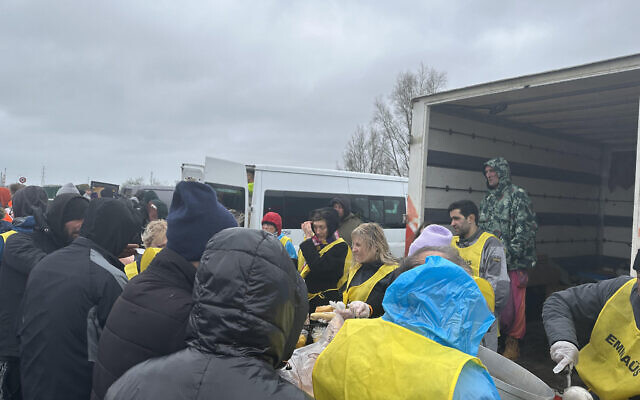SPECIAL REPORT: ‘There must be a way to treat asylum seekers as human beings’
With Passover approaching Jewish News joined Board of Deputies president Marie van der Zyl at a camp for migrants hoping for better lives in the UK, in Dunkirk, northern France
The night before, Board of Deputies president Marie van der Zyl had been detailing the full scope of her communal organisation’s work in the UK with leaders of the French Jewish community at an upmarket Parisian kosher restaurant.
But now, in an altogether different, and often harrowing situation, the Board’s president is working hard in driving rain and wind among a team of volunteers involved in a food distribution session for migrants at a squalid camp in Dunkirk, northern France.
An official from the humanitarian charity Emmaus, which provides tents, blankets, food and medical assistance to the hundreds who flock to the camp, had earlier asked Van der Zyl, and the Board’s communities manager, Lauren Keiles, why they had decided to visit the Grande-Synthe refugee camp.
Van der Zyl recalled one of the central themes of Judaism, and of the forthcoming Pesach festival, a requirement to”care for the stranger”.
For more than an hour, the team of around a dozen other volunteers, including a representative from the Representative Council of Jewish Institutions in France (CRIF ) distributed chicken, rice, bread and fruit to the young men and the smaller number of women and children who joined the queue.
Later, Van der Zyl, who had given permission for Jewish News to join her in France, praises the “dignity”, and the “politeness” of the migrants to whom she had served meals.
“I was also thinking how poignant the trip was to the Passover story,” she added. “The Torah tells us: ‘And a stranger shalt thou not oppress; for ye know the heart of a stranger, seeing ye were strangers in the land of Egypt.
“‘When strangers reside with you in your land, you shall not wrong them.’”
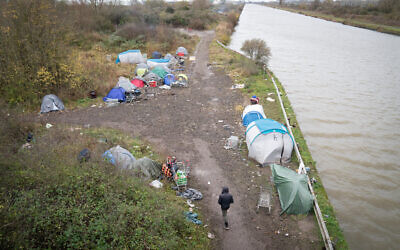
In truth, behind their politeness, many of the migrants at the camp also look hungry, desperate and forlorn.
The majority have a basic grasp of English and are able to thank us for piling food into white plastic boxes for them to take away and eat while sitting on the muddy fields.
They will then return to the tents and blankets given to them by the several charities working in the area, aiming to give the refugees at least a basic standard of living in their temporary homes.
It is a scene that probably would have not have looked out of place in biblical times.
Most in last Friday’s queue appeared to be Iraqi Kurds, who have made the 3,000-mile journey from their conflict-ridden homeland to the northern tip of France in the hope of risking their lives by paying a smuggler to get them access to one of the fleet of small boats they believe will take them to a better life in the UK.
Also in the camp were a few Iranians who had fled the regime in Tehran, some who had escaped the bloody war in Yemen and others who sought refuge from the tyrannical Taliban rulers of Afghanistan.
Striking up a conversation with one of the refugees, the Board’s outgoing community manager tells one young man she is here sending solidarity from the Jewish community back home. He responds: “I thank you.”
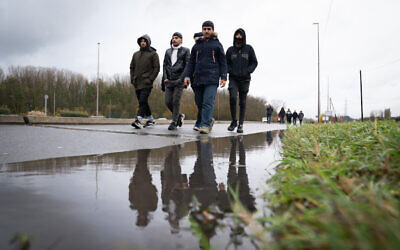
Van der Zyl and the team’s visit to the Dunkirk camp had been planned long before a row with Home Secretary Suella Braverman over a statement by the communal group that cast doubt on the legality of legislation that bars people considered to have entered Britain illegally from claiming asylum.
The Illegal Migration Bill, which passed its committee stage in Par- liament last week, sets out to stemthe number of people crossing the Channel in small boats and would give the home secretary powers to deport those who do to Rwanda.
In a speech at last week’s Community Security Trust dinner, Braverman had questioned whether the Board should be entering into the debate about the UK government’s migration policy because it was a divisive issue that split the community itself down “left and right” political lines.
But other organisations, including the Wiener Holocaust Library and The Association of Jewish Refugees, have also been among those issuing their own criticism of the Bill.
A joint statement released by the two groups last Friday said: “The Refugee Council rightly points out that people make these dangerous journeys because they have no other options to reach the UK – and that two-thirds of those arriving on small boats last year would qualify for refugee status.”
The statement added: “In the wake of the Second World War and the Holo- caust, during which millions of people were murdered, rendered stateless and displaced, the UN Refugee Convention was an important step towards better international humanitarian protection for refugees from persecution.”
Last December, when the World Jewish Congress met in Rome, a visit to the refugee camp was also discussed by the Board with Marie-Sarah Seeberger of CRIF.
“We wanted to go to see the camps to understand how the refugees were treated,” says Van der Zyl. “I believe it is right for faith leaders to step in.”
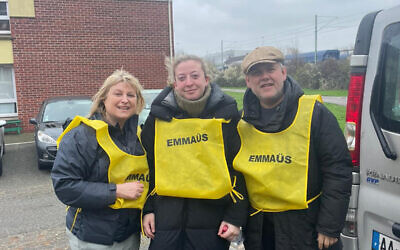
Back at the Dunkirk camp, it is difficult to find evidence that Braverman’s tough talk around deportations to Rwanda is having any impact.
In the food queue is Abdul Rahman, 16, who tells Jewish News he arrived in the camp “a few weeks ago”.
Asked if he would be willing to take a small boat to the UK, he replies: “Yes, I will, very soon. As soon as I get the call. I love the UK, I love England.”
He suggests he has family living in the UK, in Manchester but appears not to be aware of the Rwanda plan.
The British government has said 31,000 crossings were prevented from France in 2022. But, at the same time, the number of people journeying across the Channel reached 46,000, up 60 per cent from a year earlier.
More than 3,000 had already made the journey so far this year, with Home Office figures showing 197 made the crossing just on 7 March.
Small boat arrivals accounted for about 45 percent of asylum applica- tions made in 2022, but only 4 percent of people who arrived in the UK in small boats in 2021 have had a decision about their application.
Deaths in the Channel as a result of the dangerous crossings on tiny vessels are commonplace. No one knows how many migrants have died since boats overtook trucks as the most popular way for people-smugglers to operate.
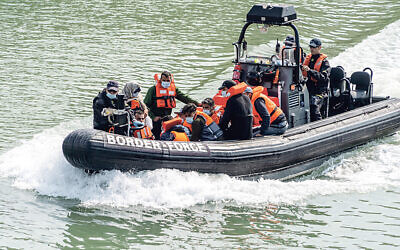
At Emmaus’ headquarters, a short drive from the camp, spokeswoman Lydia Ahmed Lemoine speaks of hundreds of corpses that were identified floating at the top of the Channel close to the French border.
Many refugees who attempt the arduous journey often do so with their legs dangling into the sea for the duration of the nighttime journey.
Condoms are regularly used as protection for the migrants precious mobile telephones, as no other available materials offer such a watertight seal.
Prime Minister Rishi Sunak spoke recently of the need to “break the cycle” of the criminal gangs enabling migrants across the Channel.
Ahmed Lemoine confirms the gangs are indeed an international business, but seems to doubt this will be possible while demand to reach the UK remains high.
Money to pay the smugglers will have been borrowed from extended families before the migrants leave their homelands.
It is most likely to be young and fit teenage boys who are chosen, with the idea being that they reach the UK and find well-paid employment, enabling them to repay family members at home.
Some of the gangs operate directly out of the UK, often making those migrants who do make it into the UK work for them for free to pay back the “debt” owed for securing their passage across the Channel.
Across the camps in northern France, the smugglers are often involved in violent clashes with other gangs, vying to control business.
At this time of year migrants will pay €3000 to a smuggler offering them a place on a small boat.
In the summer, the price rises to €4000, as demand in the calmer, warmer waters increases.
Money to pay the smugglers will have been borrowed from extended families before the migrants leave their homelands.
It is most likely to be young, and fit teenage boys who are chosen. The dream being that they reach the UK and find well-paid employment, enabling them to repay family members at home.
According to the Emmaus spokesperson, by the time they arrive in the Dunkirk camp, many migrants are already receiving telephone calls from anxious family members wanting to know when they will get their money back.
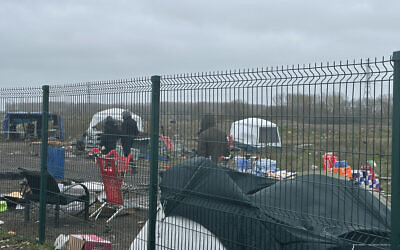
Concerns are also raised that a revised migration agreement between France and Britain, signed by the home secretary last November, at an extra cost of millions to the UK, is making the situation worse.
Last Friday, as the Board president and other communal representatives arrived at the Dunkirk camp, police had just conducted their weekly eviction exercise. Tents were taken down, blankets and other possessions were seized.
Police circled the camp and made sure the refugees walked outside without any items. But within a few hours the same migrants walk back into the camps and the charities begin the process of offering them tents and blankets again.
It is estimated the entire exercise is costing in the region of €800 per day for every single police officer involved.
“Do they evict children?,” Van der Zyl asks the Emmaus spokesperson. “Yes, of course, and pregnant women,” she is told.
“What human cruelty,”says the Board’s president. “At home we only know the word camp, we don’t know this level of detail.
“This is horrid, human beings at their very worst.”
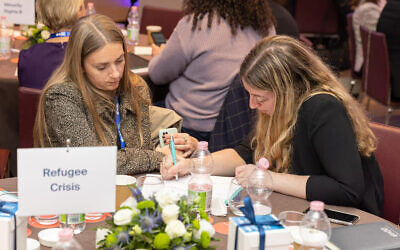
The French authorities claim to be offering migrants the prospect of new lives and housing elsewhere in France, often up to 100 miles away from the camps.
Emmaus says the refugees are aware the French authorities’ offer of housing is only temporary.
After one month they must apply for asylum. If they are then turned down, which many already have been, they are sent back to the country they had been in before arriving in France, under the terms of the Dublin Regulation.
Since Brexit, the UK is no longer part of the Dublin Regulation, and has no agreement for returning migrants to France, with Paris insisting one would have to be negotiated with the EU as a whole.
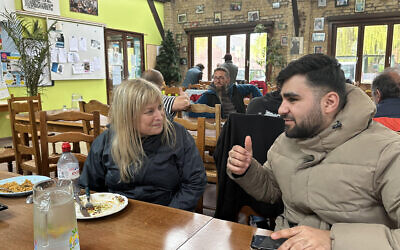
But in an otherwise very dark day, there is a chink of light to be found back at the Emmaus HQ.
Ali, now 18, had fled the violence around his home in Kurdistan five years ago, boarding a truck that crossed 12 countries before reaching France.
But his life appeared to have hit rock bottom again when a truck attempting to smuggle him into the UK, to be with his father, who he says lives in Leicester, was caught.
But what shines through as Ali chats to both the Board’s Van der Zyl and Keiles is his desire not to let setbacks in his life break him.
Now in full-time education, as a result of an intervention by charity bosses, Ali may not yet be able to travel to Leicester to see his mother, but he has been given papers allowing him to remain in France for four more years.
“I can do more, I must not stop, never give up” he tells Van der Zyl, after she praises him for being “a very brave man” who, despite all the trauma he has suffered in his life is “still smiling.”
Back in the UK, with Passover just days away, Van der Zyl confirms to Jewish News that during this year’s Seder she will find time to “think of the awful evictions where tents were taken down, and possessions removed, with the same people returning again with nothing of their own.”
She adds:”There must be a better way than this to deal with asylum applications and to treat people as human beings, and not dehumanise them.”

Thank you for helping to make Jewish News the leading source of news and opinion for the UK Jewish community. Today we're asking for your invaluable help to continue putting our community first in everything we do.
For as little as £5 a month you can help sustain the vital work we do in celebrating and standing up for Jewish life in Britain.
Jewish News holds our community together and keeps us connected. Like a synagogue, it’s where people turn to feel part of something bigger. It also proudly shows the rest of Britain the vibrancy and rich culture of modern Jewish life.
You can make a quick and easy one-off or monthly contribution of £5, £10, £20 or any other sum you’re comfortable with.
100% of your donation will help us continue celebrating our community, in all its dynamic diversity...
Engaging
Being a community platform means so much more than producing a newspaper and website. One of our proudest roles is media partnering with our invaluable charities to amplify the outstanding work they do to help us all.
Celebrating
There’s no shortage of oys in the world but Jewish News takes every opportunity to celebrate the joys too, through projects like Night of Heroes, 40 Under 40 and other compelling countdowns that make the community kvell with pride.
Pioneering
In the first collaboration between media outlets from different faiths, Jewish News worked with British Muslim TV and Church Times to produce a list of young activists leading the way on interfaith understanding.
Campaigning
Royal Mail issued a stamp honouring Holocaust hero Sir Nicholas Winton after a Jewish News campaign attracted more than 100,000 backers. Jewish Newsalso produces special editions of the paper highlighting pressing issues including mental health and Holocaust remembrance.
Easy access
In an age when news is readily accessible, Jewish News provides high-quality content free online and offline, removing any financial barriers to connecting people.
Voice of our community to wider society
The Jewish News team regularly appears on TV, radio and on the pages of the national press to comment on stories about the Jewish community. Easy access to the paper on the streets of London also means Jewish News provides an invaluable window into the community for the country at large.
We hope you agree all this is worth preserving.


